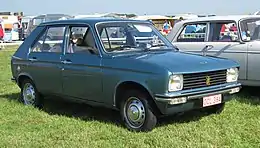


The Stellantis Mulhouse Plant is a major car plant in France owned by Stellantis. It has produced cars since 1972, notching up its first ten million in June 2008.[1] Production processes include panel and component forming, welding, body painting and final assembly.
Location and site
The plant is located on a large site at Sausheim on the Île Napoléon, on the eastern edge of the Mulhouse conurbation. This places it approximately 65 km / 40 miles to the east of the company’s principal plant at Sochaux, the two locations having been linked by the A36 autoroute since the late 1970s.
History
Peugeot started manufacturing gear-boxes (transmissions) at their Mulhouse factory in 1962. The 1960s were a period of rapid expansion for Peugeot, with the market-place success of, in particular, their 204 enabling them to overtake Simca and Citroën in the domestic sales charts, which moved the manufacturer from fourth position to second in the French market. Peugeot were sufficiently profitable in this period to pursue a strategy that involved broadening their range downmarket, to include for the first time a model in the “Supermini” class. This car, launched towards the end of 1972, was the Peugeot 104, advertised at the time as Europe’s smallest four door saloon, and the first complete car to be assembled at the company’s Mulhouse plant. Subsequent output has included the 205, 106, 206 and 206 CC as well as the 307. The plant’s top sellers to date have been the Peugeot 205 and the Peugeot 106 with 2.2 million of each produced at Mulhouse.[2]
Since 2004, Mulhouse output has also included Citroën badged vehicles starting with the Citroën C4 and, more recently, the DS4. Production of the Peugeot 308 was initially shared with the nearby Sochaux plant. 90,000 of the cars have been produced at Mulhouse: but Since April 2012 Sochaux has become the sole production facility for the 308 in France.[3]
The most recent Peugeot model produced at Mulhouse is the 208 of which production in France is shared with the Poissy plant. The 208 has been in production at Mulhouse since June 2012.[3]
Forge
Peugeot were able to choose a relatively spacious site for their Mulhouse plant, which is the only car plant in France to incorporate within its fences a large forge, originally transferred from the company’s Sochaux location in 1963.[2] The forge supplies other plants in Stellantis as well as third party customers including Ford, Volvo, Renault and BMW.[4]
Volumes
In 2005 output reached 400,000 vehicles, but in 2006 this was reduced to 341,000, and in 2007 to 294,000. In 2010 output recovered to 321,000.[5]
Personnel
In 2007 Peugeot employed 10,400 people.[6] at Mulhouse. The plant attained unwelcome media notoriety in 2006 and 2007 when several employee suicides led to questioning in the newspaper l'Humanité of the levels of pressure placed on employees to achieve ever more stretched objectives. In 2011 the reported headcount at the Mulhouse plant was down to 8,500.[5]
References
- ↑ Plaquette présentation du Centre de production de Mulhouse
- 1 2 "Historique". Mulhouse.psa.fr. Retrieved 2012-09-29.
- 1 2 "Avec la 208 PSA Mulhouse voit la vie en rose". Latribune.fr. Retrieved 2012-09-29.
- ↑ "PĂ´le MĂŠtallurgie Mulhouse". Mulhouse.psa.fr. Retrieved 2012-09-29.
- 1 2 "Chiffres clĂŠs". Mulhouse.psa.fr. Archived from the original on 2017-07-08. Retrieved 2012-09-29.
- ↑ "PSA Peugeot Citroën - Le Groupe - Production". Psa-peugeot-citroen.com. Retrieved 2012-09-29.
This article incorporates information from the equivalent entry in the French Wikipedia.
47°46′21″N 7°25′32″E / 47.77250°N 7.42556°E
